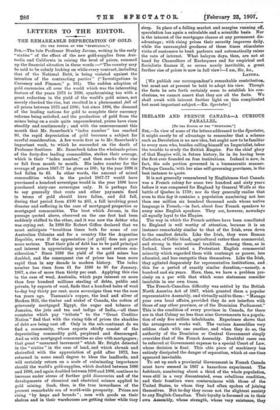LETTERS TO THE EDITOR.
THE REMARKABLE DEPRECTATION OF GOLD.
(TO THE EDITOR OF THE SPECTATOR.. J
STR,—The late Professor Stanley Jevons, writing in the early " sixties " of the effect of the new gold-supplies from Aus- tralia and California in raising the level of prices, summed up the financial situation in these words :—" The country may be said to be calmly looking on while every contract, including that of the National Debt, is being violated against the intention of the contracting parties" (" Investigations in Currency and Finance," p. 101). The sudden adoption of gold currencies all over the world which was the interesting feature of the years 1873 to 1896. synchronising too with a great reduction in the yield of the world's gold mines, not merely checked the rise, but resulted in a phenomenal fall of all prices between 1873 and 1896; but since 1896, the demand of the leading nations for gold to complete their currency reforms being satisfied, and the production of gold from the mines being on a scale quite unprecedented, prices have risen steadily and continuously ; and with the announcement this month that Mr. Sanerbeck's "index number" has reached 80, the rapid depreciation of gold becomes a subject for careful consideration. A few words first as to Mr. Sanerbeck's important work, to • which he succeeded on the death of Professor Soetbeer. Mr. Sanerbeck takes the wholesale prices of the forty-five leading commodities, strikes their average, which is their "index number," and then marks their rise or fall from month to month. His index number for the. average of prices 1867.77 he gives as 100; by the year 1896 it had fallen to 61. In other words, the amount of mixed commodities which in the period 1867-77 would have purchased a hundred sovereigns would in the year 1896 have purchased sixty-one sovereigns only. It is perhaps fair to say generally that rents and other payments fixed in terms of gold should have fallen, and did fall, during that period from £100 to £61, a fall involving great disaster and suffering in the case of mortgaged properties or mortgaged communities. The boot which Jevons, in the passage quoted above, observed on the one foot had been suddenly shifted to the other, and it was now the debtor who was crying out. In 1888 Sir Robert Giffen declared that we must anticipate " troublons times both for some of our Australian Colonies and for a country like the Argentine Republic, even if the appreciation [of gold] does not grow more serious. That their pile of debt has to be paid principal and interest in appreciating money is a most serious con- sideration." Since 1896 the yield of the gold mines has doubled, and the consequent rise of prices has been more rapid than in any decade in modern history. The index number has risen from 61 for 1896 to 80 for January, 1907, a rise of more than thirty per cent. Applying this rise in the case of wool, Australia, which pays interest on more than four hundred millions sterling of debts, public and private, by exports of wool, finds that a hundred bales of wool to-day buy thirty per cent, more sovereigns than was the case ten years ago. Tasmania's copper, the lead and silver of Broken Hill, the timber and nickel of Canada, the cotton of grievously mortgaged Egypt, the sugar and tobacco of Jamaica, the jute and tea and indigo of India,—all these countries which pay "tribute" to the "Great Creditor Nation" find that with the rising tide of prices the shackles of debt are being cast off. Only in the sub-continent do we find a community, whose exports chiefly consist of the depreciating commodity gold, perplexed and discouraged. And as with mortgaged communities so also with mortgagors ; that great "unearned increment" which Mr. Bright detected in the " sixties " in the case of land, and which shrunk and shrivelled with the appreciation of gold after 1873, has returned in some small degree to bless the landlords, and will certainly return on a scale of culminating importance should the world's gold-supplies, which doubled between 1886 and 1896, and again doubled betwein 1896 and 1906, continue to increase under stress of further gold discoveries and of the developments of chemical and electrical science applied to gold mining. Such, then, is the true inwardness of the present remarkable era of world-wide prosperity. Prices are rising "by leaps and bounds " ; men with goods on their shelves and in their warehouses are getting richer while they sleep. In place of a falling market, and margins running Off, speculation has again a calculable and a scientific bask. Nor is the interest of the mortgagee classes at any permanent dis- advantage; with rising prices their security improves daily, while the unexampled goodness of these times stimulates visits of customers to bank parlours and automatically raises the rate of interest. What halcyon days, then, are not at hand for Chancellors of Exchequers and for empirical and Socialistic finance if, as seems nearly inevitable, a great further rise of prices is now in full view l—I am, Sir, &c.,
LATONA.
[We publish our correspondent's remarkable contributioef but must not at present be held to adopt his view. Though the facts he sets forth certainly seem to establish his con- clusions, we cannot assert that they are all the facts. We shall await with interest further light on this complicated but most important subject —En. Spectator.]










































 Previous page
Previous page